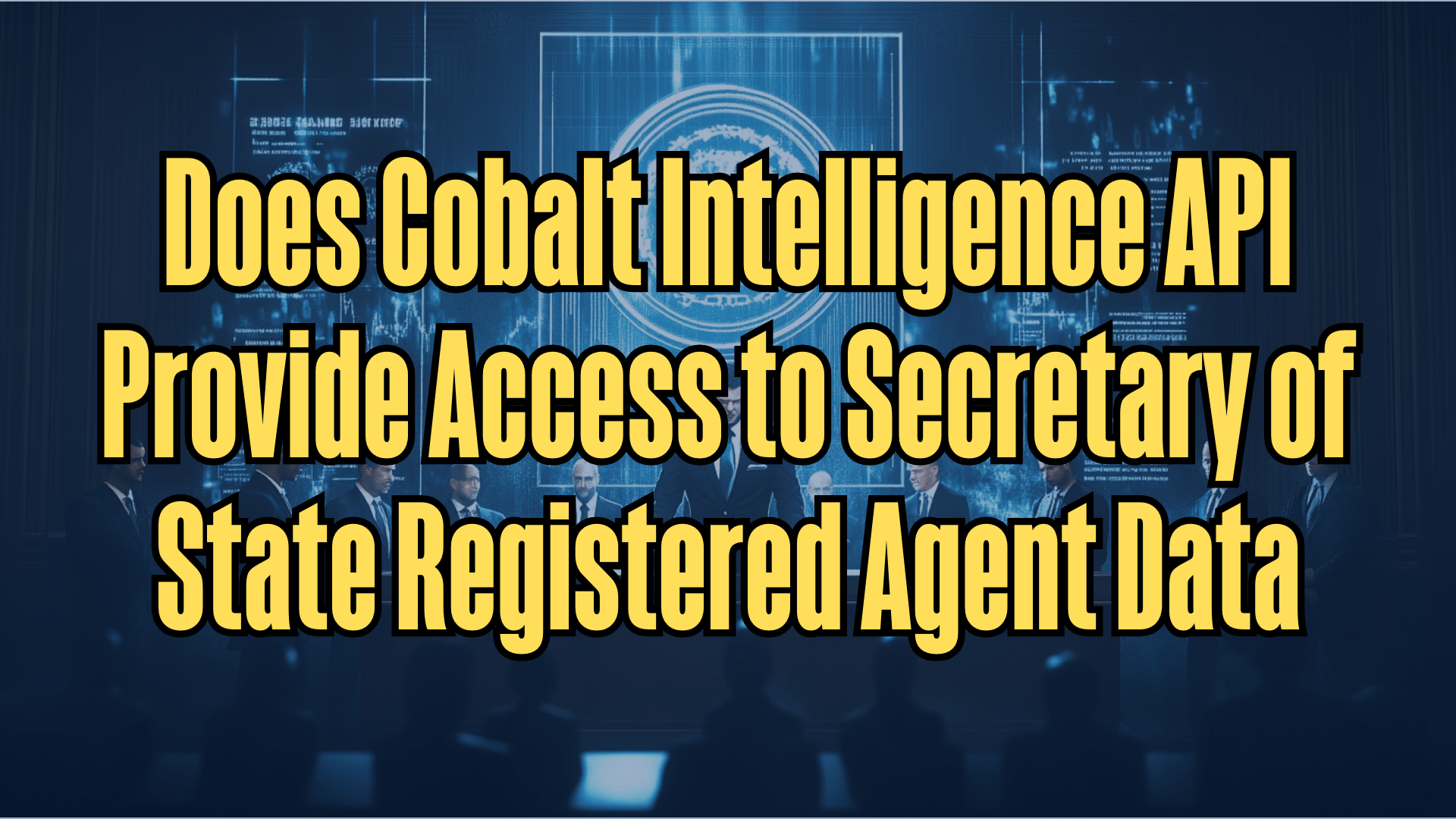Cobalt Intelligence's API can streamline a critical aspect of alternative lending due diligence: Registered Agent verification.
A cornerstone of this is verifying the legitimacy and contactability of a business through its Registered Agent (RA). But how comprehensive and reliable is this verification via API? Let's explore.
In which states is Registered Agent information available through the API?
For alternative lenders operating across the United States, comprehensive state coverage for vital business data like Registered Agent details is non-negotiable. The Cobalt Intelligence API stands out by offering extensive access to this information directly from Secretary of State (SOS) databases. Our sources confirm that Registered Agent details are available through the API in 49 states.
- This broad coverage means you can standardize your RA verification process across nearly the entire U.S. footprint, reducing the need for state-specific manual checks.
- It's important to note the specific exceptions: Registered Agent information is not available for New Jersey through the API, as this data is not listed publicly by the state. Additionally, Washington D.C. doesn't operate with an "official registered agent" in the same vein as states, impacting how this data is presented and retrieved.
- Leveraging an API that covers 49 states provides significant operational leverage, transforming what could be a state-by-state manual lookup nightmare into a single, automated query covering the vast majority of your potential deal flow. This drastically reduces the manual effort that previously slowed down processing teams by minutes, or even hours, per application.
Can the API identify which states provide Registered Agent information and distinguish between commercial and non-commercial agents?
Understanding where data is available and the nature of that data enhances programmatic decision-making. The Cobalt API is designed to return comprehensive data points when they are publicly available on the state's SOS website.
- While the API returns the Registered Agent's name and related details where the state makes them public, the API does not distinguish between commercial and non-commercial agents. The data returned mirrors what is found on the state website.
- Cobalt's system inherently knows which data fields, including Registered Agent details, are typically available for each state it integrates with. If a state provides RA information, the API is configured to retrieve it as part of the comprehensive business data return.
- The value proposition here is consistent data retrieval where available: the API provides the RA name and associated address/contact information sourced directly from the state registry. This primary-source confidence allows you to verify the listed agent against application data, flagging potential discrepancies.
If a state makes Registered Agent information publicly available, is the API able to retrieve it?
Cobalt Intelligence's fundamental approach is centered on accessing real-time, primary-source data directly from state SOS websites. This direct connection is key to the API's capability.
- The API functions by connecting directly to the state's database or navigating the state's website interface, filling out forms and submitting them just as a human would. This automation bypasses the manual process and handles nuances like CAPTCHAs.
- Because the API is designed to retrieve "pretty much anything you find on there on the secretary of state site", it follows that if a state makes Registered Agent information publicly available on its website for a specific business search, the API is built to pull that information as part of the comprehensive data return.
- This real-time retrieval from primary sources is crucial for ensuring data freshness. Business information, including RA details, can change constantly. Relying on potentially outdated stored information creates serious risk. The API's direct connection mitigates this by providing up-to-the-minute information.
Are there any specific states where Registered Agent information is known to be inaccessible or unreliable through the API, such as Delaware where the agent is always a commercial agent?
While the goal is comprehensive and reliable data, the nature of dealing with disparate state systems can present challenges.
- As mentioned, Registered Agent information is explicitly stated as inaccessible via the API for New Jersey because the state does not make this data publicly available. Washington D.C. also operates differently and doesn't have an official Registered Agent in the standard sense.
- There are instances where expected data, including RA names, were not returned or were returned incorrectly in testing for specific businesses in states like Iowa or Mississippi. Cobalt acknowledges that due to the variety across states, they might occasionally "miss" data and continuously work to improve coverage and accuracy as they learn from these cases.
- Also, there are potential inconsistencies where a state's own API (if used by Cobalt) might return different or less reliable results compared to searching the state's website manually. However, Cobalt primarily relies on directly accessing the website data unless a state API is deemed reliable. While Delaware's consistency in having commercial agents was noted, this doesn't imply inaccessibility or unreliability of the RA data itself via the Cobalt API, but rather a characteristic of that specific state's registered agents.
Does the API provide a list of available data points for a given business, including Registered Agent details?
Efficiency in integration requires clearly defined data structures and knowing what to expect from the API response.
- The Cobalt Intelligence API is designed to return comprehensive business information as part of its standard response when you query a specific business. This comprehensive return includes Registered Agent details if that information is available for the state of the business being queried.
- The API response is structured (e.g., in JSON format), making it programmatically easy to parse and extract specific fields like Registered Agent information. This standardized data return across states simplifies integration into your existing underwriting workflow.
- Beyond the data returned in the live API call for a specific business, Cobalt can provide documentation, such as a spreadsheet, that outlines the fields generally available for each state. This allows your development team to understand the potential data landscape and plan accordingly.
Can the API retrieve historical Registered Agent information, or only the most recent data?
Understanding the history of a business entity, including changes in its Registered Agent, can provide valuable context for risk assessment.
- Cobalt API can provide access to historical changes and filings for a business entity where that information is made public by the state. Specifically, the documents array returned by the API can contain a list of filings, and some states offer a history field detailing changes like Registered Agent updates.
- This means that if a state's SOS website publicly lists historical Registered Agent changes as part of a business's filing history or a dedicated history section, the API can retrieve this data. It's not limited to just the current Registered Agent on file.
- Accessing historical RA changes allows lenders to identify potential red flags or gain deeper insights into the stability and operational history of an applicant business, contributing to a more thorough risk assessment toolkit.
Are there situations where a state may have Registered Agent information, but it is not returned by the API?
While Cobalt strives for comprehensive data retrieval, the variability of state systems means this is a possibility, although efforts are made to minimize it.
- Yes, situations can arise where a state's website lists Registered Agent information, but it is not immediately returned by the API. This can occur if Cobalt's system hasn't yet been configured to capture that specific presentation of the data for that state. Cobalt continuously works to improve coverage as they encounter and learn from these variations.
- Specific examples were noted during the calls where expected RA data was not returned or was inaccurate, which Cobalt committed to investigating and correcting, confirming that such misses can happen but are addressed.
- Furthermore, while the current Registered Agent might be available, historical RA changes may not be returned if the state website does not publicly provide a history field or documents array that details these specific changes. Cobalt can only retrieve data that the state makes publicly accessible through its standard search interface.
In conclusion, the Cobalt Intelligence API offers robust capabilities for verifying Registered Agent information, covering 49 states and providing real-time, primary-source data directly from SOS websites. While exceptions and occasional data retrieval nuances exist, the API dramatically automates this critical due diligence step, reduces fraud risk by verifying key contact information, and accelerates the underwriting process. By integrating this real-time data access into your workflow, you empower your team to make faster, more accurate decisions, transforming verification from a bottleneck into a competitive advantage.












.png)